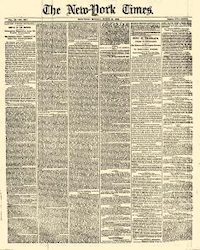The New York Times, August 3, 1860
In the session of the Statistical Congress, held in London on the 18th ult., Lord Brougham called upon Judge Jervis to read the report from the United States. In doing so he said: “I exceedingly regret that the observations I made on the first day have been interpreted into something disrespectful to the United States. No one who has known me will accuse me of such an intention. I respect our brethren of the United States, even when I differ from them. When I called attention, in the presence of our friend, Mr. Dallas, to the, in my opinion, important statistical fact, that a most respectable colored gentleman from Canada was a member of the Congress1, I only called his attention to it just as I would the attention of our excellent friend the representative of the Brazils, who is here to-day; and God knows I do not entertain the slightest disrespect for the Brazils. I ought also to have called the attention of the Count de Repalda (the Spanish representative) to the same subject; they have colonies, and they have persons of various colors in their possessions. I call his attention to it hereby. [Applause]
Judge JERVIS said that in the United States all that was done to secure statistics as to the three great events of life—birth, marriage, and death—was done by the local governments of the States and the municipal authorities. The enumeration was consequently defective. In the census of 1860, however, the marshals had been ordered to return the number of deaths in the previous twelve months, and the causes from which they occurred; and the same would be done in the present year. The promoters of statistical science hoped that ultimately all the States would be brought to concur in some general statistical system.
- On July 16, United States Minister to England George Mifflin Dallas wrote in his diary, “Lord Brougham took the opportunity, after the delivery of the address, which was really very good, abruptly to call out to me by name, and hoped I would observe that there was “a negro in the assemblage!” I perceived instantly the grossness of the act, and, seeing the black in the very centre of the philosophers, hadn’t a doubt that it was a premeditated contrivance to provoke me into some unseemly altercation with the coloured personage. I balked that by remaining silent and composed. The gentleman of colour, however, rose, and requested permission of the Prince Consort, as chairman, to thank Lord Brougham for his notice, with an emphatic conclusion, ‘I am a man.’ Query: Is not the government answerable for this insult? Or must it be regarded as purely the personal indecency of Lord Brougham? Curia advisare vult.”
